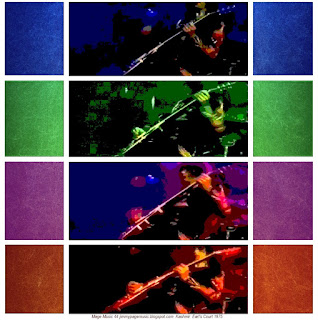~ Jimmy Page 1977 Guitar Player interview.
Mage Music 44
Magick is a process of desire + will + ritual. Yes, I know I keep telling you that, but only because it's so important. Each of the parts is necessary, and the whole is fueled by emotion. It's possible that powerful enough desire and will could drive the Magickal process without emotion fueling it, but it's hard to believe any Mage with that much will and desire could be emotionless about it. After all, emotion fuels just about everything we humans do. Emotion is connected with the most primitive parts of our brain - and not coincidentally, so is music.
It is because of the close inner connection of music and emotion that hearing music can make us feel emotion. In a sense, music (or the right kind of music) is emotion made manifest in the world.
The right kind of music - Mage Music - draws emotion out of our hearts and souls, mixes it with Magick and returns it to us so we are uplifted and purified. Emotion: It's what we live for. The rest is just experience that gives context for the emotion. That's why we listen to Mage Music - it may not be the most beautiful, technically brilliant stuff, but it delivers what we crave.
Ain't Emo
Not to pick on Emo, but it really is a poor excuse for what Wikipedia says is supposed to be "emotional hardcore" music. I don't think so. Emotion expressed as music isn't from "melodic musicianship and expressive, often confessional lyrics" but is from Magick. A Mage digs deep into his own emotion and puts it forth through the ritual of music. No wonder Jimmy Page, having become arguably the most technically accomplished guitarist in the world, left technique behind in favor of the messy business of emotion. If a musician can't deliver emotion, then all he's delivering is sound. It might be entertaining but it won't be Magick.
♪ ♪ ♪
You might want to go back to listen to last week's playlist just for the pleasure of hearing how Jimmy Page pushes the envelope, exploring new ways to bring forth emotion in his music. I love listening to the music I chose for this week's playlist because Domino (which is on both week's lists) and both the Embryos are such gutsy, meaty pieces. No emo there - they are luscious and dripping with emotion and not a confessional lyric to be heard. That's why I prefer Mr. Page's instrumentals - no matter how brilliant a vocalist he might perform with, it is Jimmy Page who brings the Magick to the music and it is his work I want to hear.
Domino evolved to become Embryo No. 2. There are echos of the past and hints of the future in these two works, and that's worth listening for as well.
I threw in the bit of Ramble On that Jimmy Page did for It Might Get Loud
No, thank YOU, Mr. Page.










